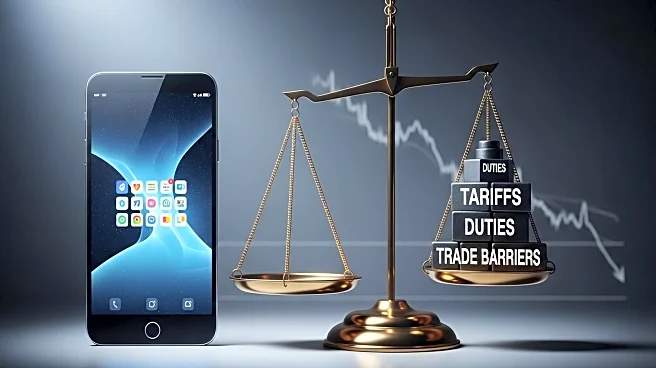What is the story about?
What's Happening?
President Trump announced new 100% tariffs on China in response to the country's tightening of rare earth exports. This decision, coupled with the introduction of export controls on critical software starting November 1st, has led to significant market reactions. Major U.S. tech firms experienced a substantial loss, with nearly $800 billion wiped from their valuations. The S&P 500 and Nasdaq Composite saw their largest declines since April, highlighting the sensitivity of the stock market to geopolitical tensions and policy changes.
Why It's Important?
The imposition of tariffs and export controls by President Trump underscores the ongoing trade tensions between the U.S. and China. These measures could have far-reaching implications for the technology sector, which relies heavily on rare earth materials and software exports. The immediate market reaction reflects investor concerns about the potential for increased costs and supply chain disruptions. Companies in the tech industry may face challenges in maintaining their competitive edge, and consumers could see price increases in tech products. The broader economic impact could include slowed growth and increased volatility in financial markets.
What's Next?
As the November 1st deadline for export controls approaches, businesses and investors will be closely monitoring any further developments or negotiations between the U.S. and China. The tech industry may need to explore alternative sources for rare earth materials and adjust their strategies to mitigate the impact of tariffs. Political leaders and trade organizations might engage in discussions to address the trade imbalance and seek resolutions to prevent further economic fallout. The situation remains fluid, with potential for further policy announcements that could influence market dynamics.
Beyond the Headlines
The decision to impose tariffs and export controls raises questions about the long-term sustainability of U.S.-China trade relations. Ethical considerations regarding the use of tariffs as a political tool and their impact on global trade norms are likely to be debated. Additionally, the cultural and economic ties between the two nations could be strained, affecting international collaborations and investments. The tech industry's reliance on global supply chains highlights the interconnectedness of economies and the need for diplomatic solutions to trade disputes.















